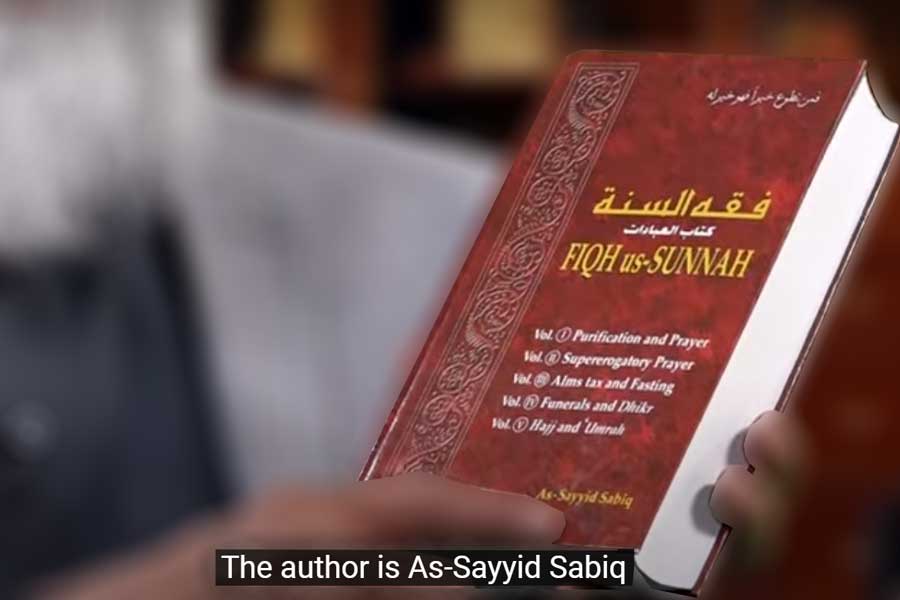The Scholar
Shaykh Sayyid Sabiq was a great Egyptian Muslim scholar who left a profound legacy to the world in the field of fiqh studies, having written one of the most popular and widely used Islamic books in the world today.
He was born in 1915 in the Egyptian Nile Delta region, where he memorized the Holy Qur’an by the age of nine and pursued a formal education in Islamic studies that culminated in his attendance at the prestigious al-Azhar University. He spent his early years under the tutelage of Shaykh Mahmud Khitab al-Subki (died 1352/1933), who was his greatest teacher, and he, in turn, was his most distinguished student. He graduated from the Faculty of Shari‘ah of al-Azhar in 1947 and continued higher studies thereafter. He then served in various capacities at al-Azhar-affiliated institutions before moving to Saudi Arabia to teach at Abdul Aziz University in Jeddah and Umm al-Qura University in Makkah. During his broad academic career, he taught and trained generations of scholars in various countries and oversaw the publication and dissemination of hundreds of articles and scholarly dissertations.
But Shaykh Sabiq was more than just a scholar. He was described as one devoted to worship, especially prayer and fasting, and possessed a sharp and witty mind along with a strong memory and exceptional intelligence. It is said that when he spoke, even dignitaries and scholars listened attentively without interruption. He also had a keen interest in, and deep knowledge of, the affairs of the Muslim world, adding a dimension of relevance to his lectures and written works that is often missing from the works of more traditional scholars.
He touched the lives of many over the years, and his more famous students included Shaykh Yusuf al-Qaradawa, Dr. Ahmad al-‘Assil, Dr. ‘Abdul-Satt?r Fathallah, the Imam of the Haram in Makkah Dr. Salih b. Humayd, and countless others. Among his contemporaries who relied on him for reference and support were the likes of the late Grand Imam of Azhar, Shaykh Mahmud Shaltut (died 1963), the popular author and scholar Muhammad al-Ghazali (died 1996) and the author Muhammad Ab? Zahr? (died 1974).
His work did not go unnoticed on the world stage. He received a Medal of Honor in Egypt in 1992 and the King Faisal Prize for Islamic Studies in 1994. His works have been translated into most languages and disseminated widely throughout the Muslim world.
He spent the last three years of his life in his native Egypt, where he continued to teach and lecture in various mas?jid until his death at the age of 85, in Dhul Qa‘dah 1420/ February 2000.
It is said that fiqh was a closed door for the masses that was opened by him in our times. He was described by a contemporary scholar as a “living encyclopedia of fiqh.”
The Text
Since its publication more than half century ago, this simple textbook of fiqh entitled Fiqh al-Sunnah, has enjoyed a remarkable popularity and acceptance in the contemporary Muslim world that appears to be unrivalled. Though several works exist with this title, its name evokes only one author. This popularity stems partly from the nature of the work and its intended purpose: to serve as a comprehensive manual of fiqh, written for the common person in modern times, and written in a comprehensible style. It is equally useful for the average person with little background in fiqh and for the more advanced students of the Islamic sciences. It has been the subject of numerous commentaries and discussions.
The book presents the practical fiqh rulings, organized topically and in a comprehensible format, along with the evidences for the rulings. Exhibiting an independent mind, he is yet free of fanaticism. He presents the strongest opinions based upon the evidences on many issues. Because it is based so heavily on Qur’an and Hadith texts, it reads at times more like a work of Had?th in the tradition of the Muwatta’ than a traditional fiqh work.
The work represents a part of the rich tradition of comparative fiqh works, and draws heavily on the works of Ibn Qudamah al-Maqdisi, Ibn al-Qayyim, al-Shawkani and al-Sanani. His contribution to the field has been in making fiqh both relevant and accessible to the modern world.
The Era
The author was born at a time which could be characterized politically as the post-colonial era in the Middle East. Many divergent ideas and movements were emerging to reassert the newly independent Muslim nations and societies, including Arab nationalism, socialism and communism. More importantly, from the perspective of the Muslim ummah, this period also represented the height of the Islamic revival period, a time of renewed intellectual vigor and interest in turning to the traditions and teachings of Islam for solutions to the world’s problems. Shaykh Sayyid, who died in 1420AH/2000CE, represents one of the premier fruits of the Islamic revival and the Islamic movement, and his work has left a mark on us all.






